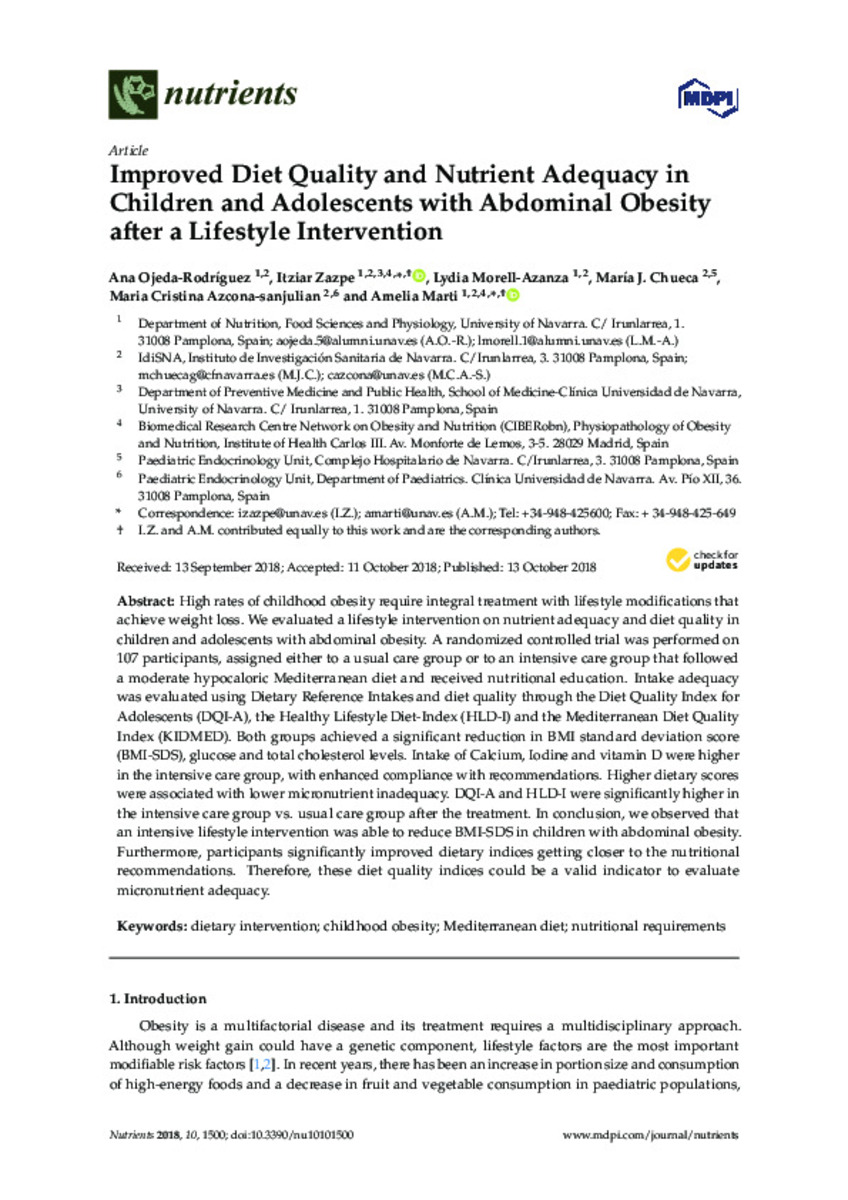Full metadata record
| DC Field | Value | Language |
|---|---|---|
| dc.creator | Ojeda-Rodríguez, A. (Ana) | - |
| dc.creator | Zazpe, I. (Itziar) | - |
| dc.creator | Morell-Azanza, L. (Lydia) | - |
| dc.creator | Chueca-Guindulain, M.J. (María Jesús) | - |
| dc.creator | Azcona-San-Julian, M.C. (María Cristina) | - |
| dc.creator | Marti-del-Moral, A. (Amelia) | - |
| dc.date.accessioned | 2022-10-06T07:51:53Z | - |
| dc.date.available | 2022-10-06T07:51:53Z | - |
| dc.date.issued | 2018 | - |
| dc.identifier.citation | Ojeda-Rodríguez, A. (Ana); Zazpe, I. (Itziar); Morell-Azanza, L. (Lydia); et al. "Improved diet quality and nutrient adequacy in children and adolescents with abdominal obesity after a lifestyle intervention". Nutrients. 10 (10), 2018, 1500 | es |
| dc.identifier.issn | 2072-6643 | - |
| dc.identifier.uri | https://hdl.handle.net/10171/64381 | - |
| dc.description.abstract | High rates of childhood obesity require integral treatment with lifestyle modifications that achieve weight loss. We evaluated a lifestyle intervention on nutrient adequacy and diet quality in children and adolescents with abdominal obesity. A randomized controlled trial was performed on 107 participants, assigned either to a usual care group or to an intensive care group that followed a moderate hypocaloric Mediterranean diet and received nutritional education. Intake adequacy was evaluated using Dietary Reference Intakes and diet quality through the Diet Quality Index for Adolescents (DQI-A), the Healthy Lifestyle Diet-Index (HLD-I) and the Mediterranean Diet Quality Index (KIDMED). Both groups achieved a significant reduction in BMI standard deviation score (BMI-SDS), glucose and total cholesterol levels. Intake of Calcium, Iodine and vitamin D were higher in the intensive care group, with enhanced compliance with recommendations. Higher dietary scores were associated with lower micronutrient inadequacy. DQI-A and HLD-I were significantly higher in the intensive care group vs. usual care group after the treatment. In conclusion, we observed that an intensive lifestyle intervention was able to reduce BMI-SDS in children with abdominal obesity. Furthermore, participants significantly improved dietary indices getting closer to the nutritional recommendations. Therefore, these diet quality indices could be a valid indicator to evaluate micronutrient adequacy.High rates of childhood obesity require integral treatment with lifestyle modifications that achieve weight loss. We evaluated a lifestyle intervention on nutrient adequacy and diet quality in children and adolescents with abdominal obesity. A randomized controlled trial was performed on 107 participants, assigned either to a usual care group or to an intensive care group that followed a moderate hypocaloric Mediterranean diet and received nutritional education. Intake adequacy was evaluated using Dietary Reference Intakes and diet quality through the Diet Quality Index for Adolescents (DQI-A), the Healthy Lifestyle Diet-Index (HLD-I) and the Mediterranean Diet Quality Index (KIDMED). Both groups achieved a significant reduction in BMI standard deviation score (BMI-SDS), glucose and total cholesterol levels. Intake of Calcium, Iodine and vitamin D were higher in the intensive care group, with enhanced compliance with recommendations. Higher dietary scores were associated with lower micronutrient inadequacy. DQI-A and HLD-I were significantly higher in the intensive care group vs. usual care group after the treatment. In conclusion, we observed that an intensive lifestyle intervention was able to reduce BMI-SDS in children with abdominal obesity. Furthermore, participants significantly improved dietary indices getting closer to the nutritional recommendations. Therefore, these diet quality indices could be a valid indicator to evaluate micronutrient adequacy. | es_ES |
| dc.description.sponsorship | The IGENOI study was supported by a MERCK foundation grant and an ORDESA-AEP grant | es_ES |
| dc.language.iso | eng | es_ES |
| dc.publisher | MDPI AG | es_ES |
| dc.rights | info:eu-repo/semantics/openAccess | es_ES |
| dc.subject | Dietary intervention | es_ES |
| dc.subject | Childhood obesity | es_ES |
| dc.subject | Mediterranean diet | es_ES |
| dc.subject | Nutritional requirements | es_ES |
| dc.title | Improved diet quality and nutrient adequacy in children and adolescents with abdominal obesity after a lifestyle intervention | es_ES |
| dc.type | info:eu-repo/semantics/article | es_ES |
| dc.description.note | This article is an open access article distributed under the terms and conditions of the Creative Commons Attribution (CC BY) license (http://creativecommons.org/licenses/by/4.0/). | es_ES |
| dc.identifier.doi | 10.3390/nu10101500 | - |
| dadun.citation.number | 10 | es_ES |
| dadun.citation.publicationName | Nutrients | es_ES |
| dadun.citation.startingPage | 1500 | es_ES |
| dadun.citation.volume | 10 | es_ES |
Files in This Item:
Statistics and impact
Items in Dadun are protected by copyright, with all rights reserved, unless otherwise indicated.






